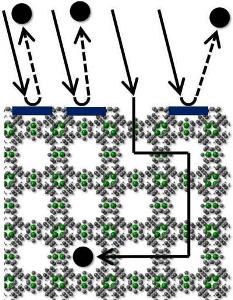Aug 4 2014
Metal-organic frameworks (MOFs) can take up gases similar to a sponge that soaks up liquids. Hence, these highly porous materials are suited for storing hydrogen or greenhouse gases. However, loading of many MOFs is inhibited by barriers.
 Loading of highly porous metal-organic frameworks (MOFs) that are made of metallic nodes (green) and organic connection elements (gray) with gas molecules is often inhibited by surface barriers. Credit: Figure: IFG/KIT
Loading of highly porous metal-organic frameworks (MOFs) that are made of metallic nodes (green) and organic connection elements (gray) with gas molecules is often inhibited by surface barriers. Credit: Figure: IFG/KIT
Scien-tists of Karlsruhe Institute of Technology (KIT) now report in Nature Communications that the barriers are caused by cor-rosion of the MOF surface. This can be prevented by water-free synthesis and storing strategies.
MOFs are crystalline materials consisting of metallic nodes and organic connection elements. They have a very large surface area and are highly porous. Like a sponge, they can take up other mole-cules. MOFs, produced on a large technical scale, are highly suited for the storage of gases: When the gas enters the solid, it is partly liquefied. The density increases and much more molecules can be stored in the same volume. Among others, MOFs are suited for the storage of hydrogen in the tank of hydrogen-driven automobiles. They can also be used for storing greenhouse gases like carbon dioxide and methane. Other applications are substance separation, catalysis, and sensor technology. For any application, an appropri-ate MOF can be produced. Mostly, MOFs have the form of a pow-der. In the past ten years, more than 20,000 different representatives of this class have been synthesized and characterized in detail.
"For nearly all applications, loading of these highly porous crystals with molecules is essential," Lars Heinke of the Institute of Function-al Interfaces (IFG) of KIT explains. "The efficiency of molecule transport into the porous particles is crucial to the performance of the MOFs." In many MOF materials, however, loading is inhibited largely by so-called surface barriers. The surface of the sponge is broken, the pores are clogged, and loading is delayed significantly. This limits the application opportunities.
To better understand and identify the reasons of these problems, the IFG researchers studied the formation of surface barriers. For this purpose, they conducted fundamental experiments on thin, structurally perfect MOF layers mounted on solid substrates. These SURMOFs (SURface-mounted Metal-Organic Frameworks) are characterized by a high order and ideal structure. The researchers succeeded in attributing the barriers to a corrosion of MOF layers on the surface. They demonstrated how corrosion of the surface layer proceeds and found that water plays a central role. "Many scientists thought that these surface barriers are intrinsic and, hence, cannot be prevented. This assumption has now been disproved. It is possible to produce MOFs for loading without "clogging"," says the Head of KIT's IFG, Professor Christof Wöll. The work reported in the journal "Nature Communications" refutes several previous hypotheses.
The findings might be helpful for many applications of MOFs. Due to the results of the KIT researchers, water-free synthesis strategies for MOFs will have to be developed in the future. Improved materials will ensure barrier-free transport of molecules from the gas phase and liquid phase into MOFs. This will enable to further increase the efficiency of these promising storage and functional materials.
Source: http://www.kit.edu/